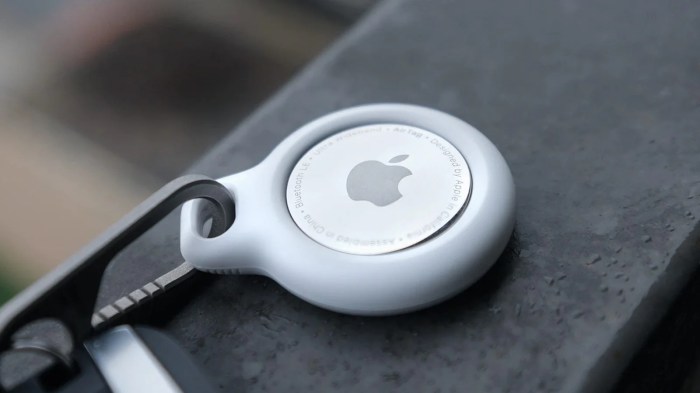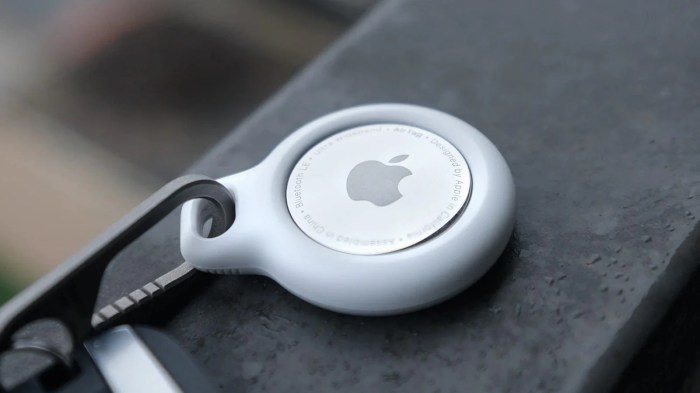Apple sued over AirTags privacy everything you need to know. This lawsuit highlights serious privacy concerns surrounding Apple’s AirTag technology. The core complaint centers on the potential for misuse of the tracking device, leading to stalking and harassment. The case explores the legal, public, and technological aspects of this debate, providing a comprehensive overview of the controversy.
The AirTag, a seemingly innocuous device, has become embroiled in a legal battle that scrutinizes its potential for harm. This article dives deep into the lawsuit, analyzing the potential for misuse, the legal arguments, and the public reaction. It compares AirTag to other location-tracking devices, examines potential outcomes, and considers the future implications for Apple and the tech industry.
Introduction to the Apple AirTag Lawsuit
The Apple AirTag lawsuit centers on allegations that Apple’s AirTag technology, designed for tracking personal belongings, was misused for stalking and harassment. Plaintiffs argue that Apple’s design and marketing strategies enabled this misuse, without sufficient safeguards to prevent unwanted tracking. The core complaint highlights the lack of preventative measures and the resulting harm to individuals targeted by this technology.Apple’s design, marketing, and lack of sufficient safeguards are at the heart of the lawsuit.
The lawsuit argues that Apple, while aware of the potential for misuse, failed to adequately address the issue. This failure, according to the plaintiffs, directly contributed to the harm experienced by those targeted by AirTags deployed for malicious purposes.
Specific Actions by Apple
Apple’s marketing materials and design choices are central to the lawsuit’s arguments. The company’s marketing emphasized the convenience and security of AirTag technology, yet critics contend that this marketing obscured the potential for misuse. The plaintiffs argue that Apple’s initial design, which lacked a system to identify or track unwanted AirTags, exacerbated the problem.
Key Figures and Organizations Involved
Numerous individuals and organizations are implicated in the lawsuit. Plaintiffs, representing victims of AirTag harassment, are seeking compensation for the distress and harm caused by the misuse of the technology. Attorneys representing these plaintiffs are actively pursuing legal action against Apple. Legal organizations and consumer advocacy groups are also playing a role in this litigation, supporting the plaintiffs and raising awareness about the issue.
The specific individuals and groups involved are detailed in the legal filings.
Historical Context of Location Tracking Privacy Concerns
Concerns about privacy violations related to location tracking have a long history. The widespread adoption of GPS technology and mobile devices has led to an increase in the collection and use of location data. Similar lawsuits involving GPS tracking technology, such as those related to cell phone location data and other personal location tracking devices, have been filed in the past.
These historical precedents demonstrate a consistent societal struggle to balance technological advancements with individual privacy rights. For example, the rise of location-based advertising has prompted public debate about the ethical use of personal data, highlighting the ongoing tension between technological advancement and individual privacy.
The Privacy Concerns Surrounding AirTags

AirTags, Apple’s small Bluetooth trackers, have revolutionized finding misplaced items. However, this convenience has brought about significant privacy concerns, sparking heated debates and legal battles. The potential for misuse and the inherent risks associated with this technology are a major point of contention.The ability to track someone’s location without their knowledge raises serious ethical questions, particularly when considering the potential for harassment and stalking.
These concerns are not unfounded; real-world examples of AirTags being used for malicious purposes have emerged, highlighting the urgent need for robust security measures and user awareness.
Apple’s AirTags are facing a privacy lawsuit, and the details are pretty interesting. It’s got me thinking about other tech-related legal battles, like the case of a district attorney who, according to AI, charged himself with murder. The whole AirTags situation boils down to concerns about tracking and data collection, which seems like a recurring theme in the tech world.
Hopefully, the legal process will help clarify things for everyone.
Potential for Misuse of AirTag Tracking Technology
The ease with which AirTags can be attached to objects without the owner’s knowledge creates a significant risk of misuse. A malicious actor could attach an AirTag to a person’s vehicle or belongings without their awareness, providing constant tracking of their movements. This is not just a theoretical concern; reports of individuals finding AirTags attached to their vehicles or personal items demonstrate the vulnerability of the technology.
AirTags and Stalking or Harassment
The insidious nature of AirTag tracking makes it a potent tool for stalking and harassment. Knowing someone’s precise location at all times can cause significant emotional distress and safety concerns. Victims may experience anxiety, fear, and a loss of personal freedom due to the constant surveillance. The psychological impact of this type of tracking is undeniable and underscores the critical need for stronger privacy protections.
Comparison to Other Location Tracking Devices
AirTags are part of a broader category of location tracking devices, each with varying degrees of security and user experience. Other GPS trackers, while offering similar functionality, often require more explicit consent and user interaction for activation and tracking. This difference in user experience and control contributes to the debate surrounding AirTags’ privacy implications. Furthermore, the ease of attaching AirTags to objects without the owner’s knowledge, as opposed to other tracking devices that may require a more visible or explicit activation, exacerbates the privacy concerns.
User Experience and User Role in Privacy Issues
Users play a crucial role in managing the privacy implications of AirTag technology. The onus is on the user to be aware of their surroundings and to take precautions to safeguard their privacy. For instance, checking for unknown devices attached to their belongings is an important step. Users should also be educated on the potential misuse of the technology and the steps they can take to mitigate these risks.
This proactive approach by users is essential to ensure the responsible use of AirTag technology.
Arguments for the Beneficial Use of AirTag Tracking Technology
Proponents of AirTag technology emphasize its convenience and utility for everyday tasks, such as locating lost keys or pets. The ease of use and the peace of mind provided by being able to quickly locate lost items are significant advantages. However, these benefits must be weighed against the potential for misuse and the associated privacy concerns. The potential for tracking is a significant issue, which must be balanced against the potential for good use.
Security Features Comparison Table
| Feature | AirTags | GPS Trackers (e.g., Tile Mate) | Smartwatches (e.g., Apple Watch) |
|---|---|---|---|
| Ease of unauthorized attachment | High | Medium | Low |
| User Awareness Required | Medium | High | High |
| Transparency of Tracking | Low | Medium | High |
| Privacy Controls | Limited | More Robust | Robust |
| Notification Mechanisms | Limited (if user is close) | More Comprehensive | Comprehensive |
This table illustrates a comparison of security features across different location tracking devices. Note that the security features are dynamic and subject to change, depending on the specific model or version of the device.
Legal Aspects of the Case
The Apple AirTag lawsuit delves into complex legal territory, challenging the balance between user convenience and privacy rights. This section explores the precedents set in similar cases, the specific claims made by the plaintiffs, and the potential impact of a favorable ruling. It also details the legal process and the role of the court in determining the outcome.The legal framework surrounding privacy violations in the digital age is constantly evolving.
The AirTag case presents a unique opportunity to examine how existing laws and precedents apply to new technologies and potential abuses of user data.
Legal Precedents
Prior cases involving privacy violations related to tracking devices and data collection provide a crucial foundation for the arguments in the AirTag lawsuit. These cases often center on issues of trespass, intrusion, and the unauthorized use of personal information. For instance, precedents related to stalking and harassment using GPS technology offer relevant parallels to the potential misuse of AirTags.
Similar lawsuits involving other location-tracking devices have also established legal precedents that can influence the current case.
Plaintiff Claims
The plaintiffs in the AirTag lawsuit are likely to allege violations of their privacy rights. Their claims might focus on the potential for AirTags to be used for stalking, harassment, or the invasion of personal space. These claims could involve specific instances where AirTags were misused or the general potential for such misuse. The legal arguments will likely emphasize the lack of user control over the devices and the absence of adequate safeguards against misuse.
Potential Ramifications of a Ruling
A ruling in favor of the plaintiffs could have significant ramifications for the tech industry. It could lead to stricter regulations regarding location tracking and the use of similar technologies. This could also affect the design and implementation of privacy controls for these types of devices. The outcome could set a precedent that influences the development of privacy policies and safety features in future product designs.
Role of the Court and Legal Process
The court’s role is to interpret existing laws and apply them to the specific facts of the case. The legal process involves gathering evidence, presenting arguments, and ultimately reaching a judgment. This process could include depositions, interrogatories, and the presentation of expert testimony. The outcome will be influenced by the strength of the evidence and the legal arguments presented by both sides.
Legal Arguments in the Lawsuit (Table)
| Argument Category | Description |
|---|---|
| Violation of Privacy Rights | Plaintiffs argue that the use of AirTags for tracking without explicit consent constitutes a violation of their right to privacy, including the right to be free from unwarranted surveillance. |
| Intentional Infliction of Emotional Distress | Plaintiffs might claim that the deliberate use of AirTags to track or harass them caused significant emotional distress, meeting the legal criteria for this tort. |
| Trespass | Potential arguments might involve unauthorized entry into private property or spaces using the AirTag tracking function. |
| Lack of User Control | Plaintiffs may argue that Apple’s design and functionality of AirTags lack appropriate user control to prevent misuse and limit the potential for stalking or harassment. |
| Negligence | Potential arguments about Apple’s failure to adequately address potential misuse or implement sufficient safeguards. |
Public Reaction and Impact

The Apple AirTag lawsuit ignited a firestorm of public discourse, raising questions about privacy, technology, and corporate responsibility. Social media became a battleground for opinions, amplifying both the concerns and the counterarguments. The case exposed a fundamental tension between the convenience of innovative products and the need for robust user privacy protections. Apple’s response to the allegations played a significant role in shaping public perception and the long-term impact on its brand image.
Public Discourse and Social Media Influence
The lawsuit sparked a lively debate across various online platforms. Discussions centered around the potential misuse of AirTags for stalking and harassment, contrasting with Apple’s argument about the device’s legitimate tracking and safety applications. Social media platforms became forums for both fervent support and staunch criticism of Apple’s actions. News outlets and influencers amplified these conversations, shaping the narrative and driving public opinion.
The speed and reach of online discussions played a critical role in shaping the public perception of the case. Users shared personal experiences, concerns, and opinions, influencing others and creating a powerful collective voice.
Public Opinion on Apple’s Handling
Public opinion regarding Apple’s response to the lawsuit was largely negative. Many viewed Apple’s initial stance as defensive, emphasizing product features over user privacy concerns. Criticism focused on the company’s perceived lack of proactive measures to address potential misuse and the perceived slowness in acknowledging the validity of user concerns. There was a significant portion of the public who believed Apple should have taken a more proactive approach in mitigating the risks associated with AirTag technology.
Impact on Apple’s Brand Image
The lawsuit undeniably had a negative impact on Apple’s brand image. The public perception of the company shifted from one of innovation and user-friendliness to one of potentially endangering user privacy. The negative publicity generated by the case could potentially affect future sales and customer loyalty. However, Apple’s substantial brand recognition and loyal customer base will likely help the company navigate the challenges presented by the lawsuit.
Press Coverage Summary
The press coverage surrounding the lawsuit was extensive and varied in tone. News outlets reported on the legal proceedings, the privacy concerns raised by the case, and the public reaction to Apple’s actions. Some articles highlighted the potential for misuse of the technology, while others emphasized the legitimate uses of AirTags. Coverage ranged from detailed legal analyses to more general discussions about technology and privacy in the digital age.
Categorization of Public Reactions
| Category | Description | Examples |
|---|---|---|
| Positive | Support for Apple’s view that AirTags provide a useful safety feature, not a stalking tool. Appreciation for the convenience and potential for enhancing safety in specific situations. | “AirTags are great for keeping track of kids and pets.” “I use it to locate my car in a crowded parking lot.” |
| Negative | Concern about the potential for misuse of AirTags for stalking and harassment. Disapproval of Apple’s initial response and perceived lack of proactive measures. | “AirTags could be used to track someone without their knowledge.” “Apple’s response was too slow to address user concerns.” |
| Neutral | Balanced views, acknowledging both the potential benefits and risks associated with AirTags. Views that depend on individual usage and circumstances. | “AirTags are a double-edged sword.” “It depends on how the technology is used.” |
Potential Outcomes and Future Implications
The Apple AirTag lawsuit has ignited a crucial debate about privacy in the digital age. Beyond the immediate legal ramifications, the case has the potential to reshape how technology companies design products and how users perceive their privacy rights. The outcome will significantly influence the future of location tracking technology and potentially affect similar product lines in the tech industry.
Possible Outcomes of the Legal Proceedings
The AirTag lawsuit’s outcome hinges on several factors, including the specific claims made by the plaintiffs, the evidence presented in court, and the interpretation of existing laws regarding privacy and consumer rights. A favorable ruling for the plaintiffs could lead to substantial monetary compensation and a reevaluation of Apple’s practices. Conversely, a dismissal of the claims could signal a less stringent approach to product design and user privacy.
Apple’s AirTags are facing some privacy concerns, and it’s a hot topic right now. Meanwhile, Google just dropped a teaser for the Pixel 4a release date, which is pretty exciting news, especially for those interested in budget-friendly smartphones. But back to the AirTags, understanding the details of the lawsuit surrounding their privacy implications is important for anyone considering purchasing one, and checking out the details is well worth it.
google pixel 4a release date teaser announcement highlights the tech industry’s constant innovation. Ultimately, staying informed about products like AirTags and their potential implications is key.
A potential settlement, a compromise between the parties, might also be reached. This outcome would avoid lengthy legal proceedings while potentially addressing the core concerns of the plaintiffs.
Potential Changes to Apple’s Product Design or User Policies
The AirTag case could force Apple to modify its product design and user policies. These changes could include enhanced transparency regarding location tracking capabilities, more explicit user consent requirements, and potentially stricter guidelines regarding the use of location data. For example, Apple might implement an opt-in system for location tracking that provides clear and detailed explanations about how the data is collected and used.
So, Apple’s AirTags are facing a privacy lawsuit, and it’s a pretty big deal. If you’re looking to learn all the details, check out the latest news on the topic. While you’re researching, why not snag some sweet deals on biking gear? Check out get rolling with up to 50 off biking gear at steep and cheap – perfect for those exploring the city after you’ve absorbed all the AirTag privacy information.
Regardless, it’s important to stay informed about how tech impacts our lives, and this lawsuit definitely raises some interesting questions.
Such measures would likely influence future product designs and the privacy policies of similar tech companies.
Potential Consequences for Consumers and Their Privacy in the Future
The AirTag case could set a precedent for consumer rights regarding privacy in the tech industry. Consumers may expect greater transparency and control over their location data. This could lead to a rise in demand for privacy-focused technologies and services. Consumers might become more critical of location-tracking apps and services, seeking those with robust privacy safeguards and clear data usage policies.
Potential Impact of the Lawsuit on the Wider Tech Industry
The outcome of the AirTag case will likely affect the entire tech industry. Companies that rely on location tracking technologies, such as social media platforms, ride-sharing services, and navigation apps, might need to adapt their products and services to comply with potential new legal standards or consumer expectations. This adaptation could involve modifications to privacy policies, improved data security measures, and greater transparency about how user data is collected and used.
Summary Table of Potential Future Implications
| Aspect | Potential Positive Implications | Potential Negative Implications |
|---|---|---|
| Consumer Privacy | Increased awareness and control over personal location data. Potential for more stringent privacy regulations. | Potential for increased complexity in using location-based technologies. Possible limitations on certain functionalities. |
| Tech Industry | Greater emphasis on privacy-focused design and product development. | Potential for higher costs and reduced profitability for companies that rely on location data. |
| Product Design | More transparent and user-friendly product designs emphasizing data privacy. | Possible delays or alterations in product development cycles due to regulatory changes. |
Illustrative Examples: Apple Sued Over Airtags Privacy Everything You Need To Know
The Apple AirTag, a seemingly innocuous device for tracking belongings, has sparked intense debate regarding its potential for misuse. This section delves into various scenarios illustrating how AirTags could be employed for malicious purposes, alongside examples of similar privacy issues in the tech industry, and contrasting positive uses. Understanding these potential applications is crucial for evaluating the device’s overall impact on personal safety and privacy.The core concern revolves around the ease with which AirTags can be deployed without the knowledge or consent of the target.
This raises profound privacy questions about the level of control individuals have over their personal space and data in the digital age.
Malicious Use of AirTags
AirTags, designed for tracking, can be easily repurposed for nefarious activities. A malicious actor could discreetly attach an AirTag to a victim’s vehicle or bag without their knowledge. The AirTag would then transmit location data to the attacker’s device, allowing them to monitor the victim’s movements and potentially gain access to sensitive information.
Similar Privacy Concerns in Tech
The technology industry has witnessed numerous instances of privacy violations, often driven by the potential for misuse of personal data. Examples include the Cambridge Analytica scandal, where user data was harvested without consent, and various data breaches that exposed sensitive information. These cases highlight the need for robust privacy protections and ethical considerations in the design and implementation of new technologies.
Hypothetical Privacy Violation Case
Imagine a scenario where an ex-partner, seeking to harass their former spouse, discreetly attaches an AirTag to their vehicle. The ex-partner then monitors the spouse’s movements, leading to unwarranted stress and anxiety. The spouse, unaware of the tracking device, is left vulnerable to emotional distress and potential physical harm.
Positive Use of AirTags
AirTags have the potential to be valuable tools for locating lost or stolen items. For instance, a user could attach an AirTag to their child’s backpack, allowing them to quickly locate it in case of accidental misplacement. Likewise, a pet owner could use an AirTag to track their lost pet.
Hypothetical Court Ruling Impacting Apple, Apple sued over airtags privacy everything you need to know
A hypothetical court ruling could severely impact Apple’s reputation if it found them culpable in facilitating malicious activities through their AirTag technology. A ruling might require Apple to implement additional security measures, potentially increasing the complexity and cost of AirTag production. Alternatively, the ruling could lead to a significant drop in sales, impacting Apple’s financial performance.
Case Study: AirTag Misuse for Harmful Activities
A disgruntled employee, seeking revenge against their former employer, discreetly places an AirTag on their boss’s car. The employee then tracks the boss’s movements and shares the data with other individuals, creating a hostile work environment. The resulting stress and harassment can have a significant negative impact on the victim’s health and career. This scenario demonstrates the potential for AirTags to be used for more than just tracking belongings, emphasizing the importance of safeguarding personal data.
Outcome Summary
The Apple AirTag lawsuit raises crucial questions about user privacy in the age of ubiquitous location tracking. The potential for misuse and the legal precedents set by this case have significant implications for the future of similar technologies. Ultimately, the outcome will shape how we think about and use location-tracking devices, forcing a discussion about responsibility, security, and the ethical considerations within the tech industry.
Apple’s response and the public’s reaction will be critical in shaping the future of this technology.





